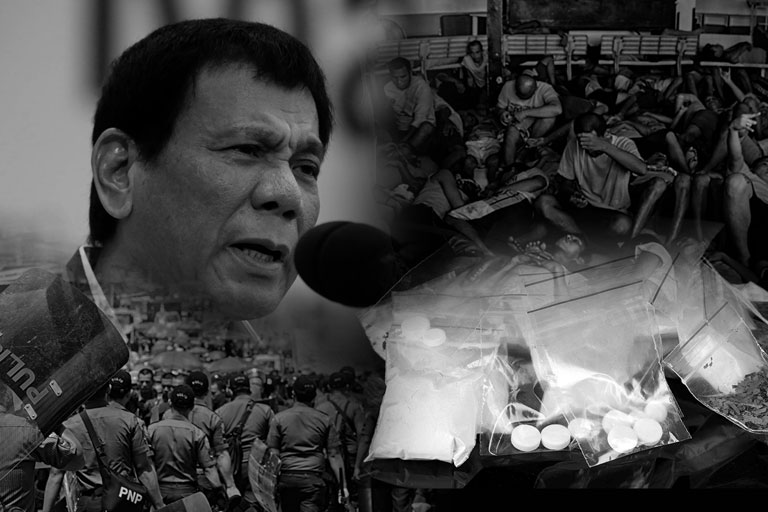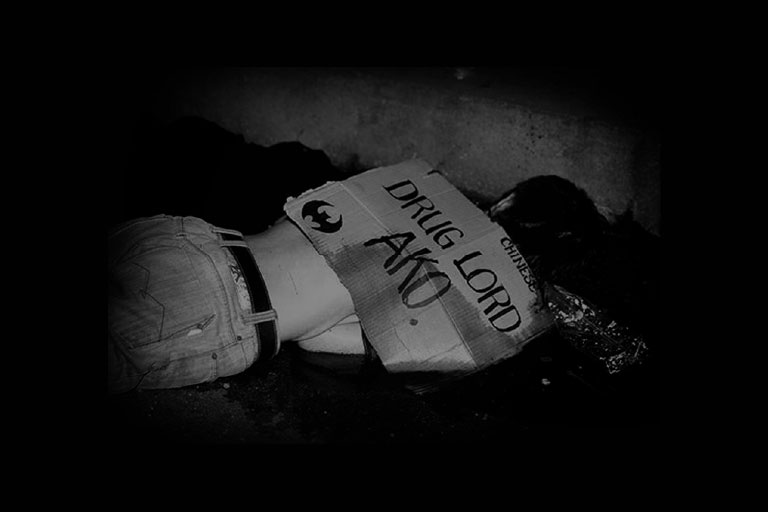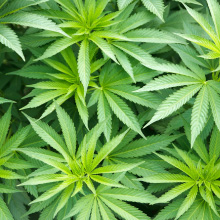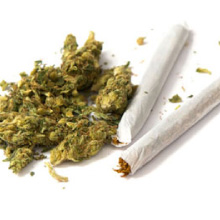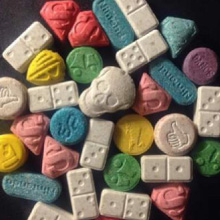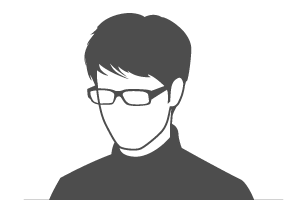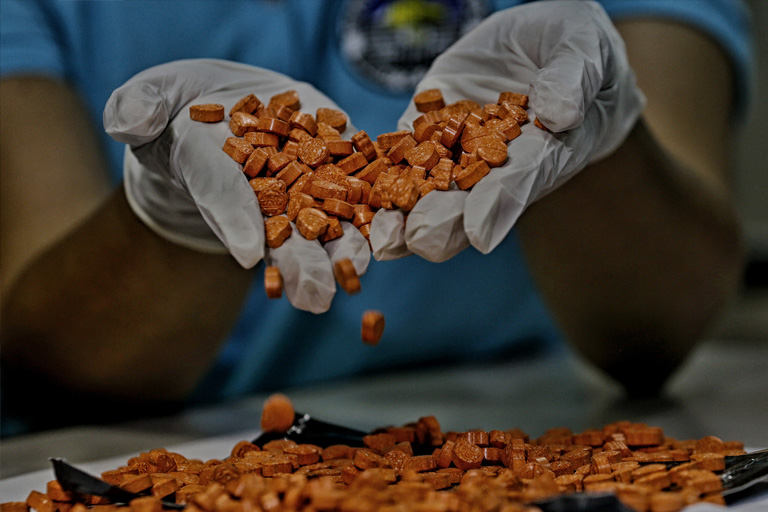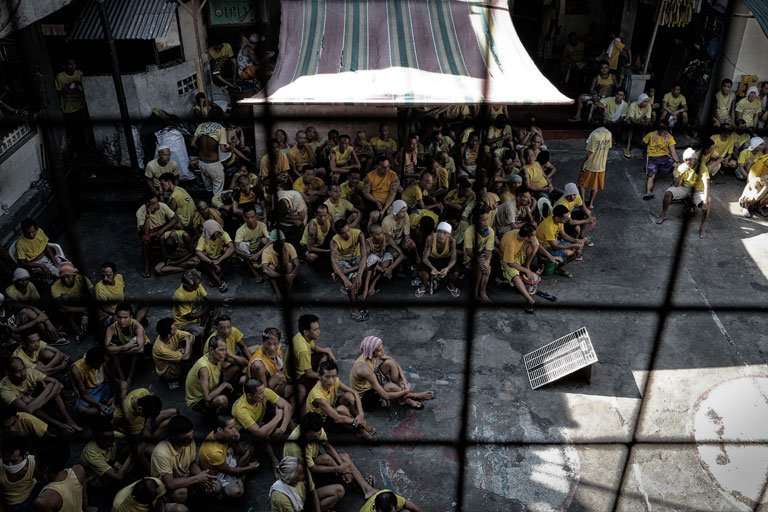A
global policy shift is underway after the war on drugs that dragged on for decades saw no success. In the Philippines, the same war is just beginning and despite popular support, may be doomed to the same fate.
Over the past months, a country of 100 million watches President Rodrigo Duterte try applying nationally a formula his supporters find to have worked in Davao City, long hailed a haven to honest citizens and a hell to crooks. There, as mayor for 22 years, his iron-fist approach restored security amid vigilante killings and set up social services unusual in the underdeveloped south.
On the campaign trail, Duterte vowed an end to crime and illegal drugs within his first year as president. To do this, he chose to suppress the drug trade through an aggressive, even violent, crackdown on the market. An all-out war.
John Collins, executive director of London School of Economics IDEAS International Drug Policy Project, said the Philippines has declared a war "identical" to those launched in the United States and parts of Latin America and Asia in the past decades. The campaigns led to arrests and deaths but did little to hold back the stream of substances.
"The policies pursued, in this case prohibition and repression, don't succeed in reducing the size of the market and in many cases inflame the violence and corruption associated with the market," Collins told Philstar.com in an email.
Deaths, violence and disease: A policy effect
In Duterte's early months as leader, installed by a record 16 million voters, about 3,500 people have died—almost half were killed in police operations. Duterte's team, however, tried washing its hands over killings outside police function. His top cop, Director General Ronald dela Rosa, said the deaths should not be blamed on the government.
What the world witnessed in countries with wars against cartels like Mexico, however, were deaths and "spiraling levels of violence" which many experts have attributed to an ill-conceived government policy.
At least one thousand leaders, including those whose countries have waged war against drugs, admitted that it was ineffective, misguided and only led to disaster.
"What we find is that aggressive enforcement often spikes violence by disrupting cartel structures, leading to fragmentation of operations whereby members of cartel go to war with each other for control of the organization or splinter into rival groups competing over turf," Collins said.
At least 1,000 leaders, including those whose countries have waged a war against drugs, admitted most recently in April that it was ineffective, misguided and only led to disaster.
"In Latin America, the 'unintended' consequences (of war) have been disastrous. Thousands of people have lost their lives in drug-associated violence. Drug lords have taken over entire communities. Misery has spread. Corruption is undermining fragile democracies," wrote Brazil's President Fernando Henrique Cardoso in 2009.
The drug war in Thailand in 2003 was backed by public support, but the country eventually pulled back from the policy marked by related killings and shunning of drug users as it did little to curb demand. Instead, addicts consumed illegal substances in hiding and diseases eventually spread. Treatment was neither available in prisons.
The United States, where President Richard Nixon called drugs "public enemy number one" in 1971, saw a ballooning number of poor, black people behind bars while drug supply and production were only temporarily disrupted.
"(The war in the US) has destroyed policy-community relations in many areas, and has not noticeably reduced the size of the drug market, merely displaced it in certain cases," Collins said. "The Philippines is witnessing the same dynamic."
What Duterte and his men are not saying, however, is that the Philippines' experience is not at all unique, and some devastating results could already be seen.
Vanda Felbab-Brown, an urban violence and internal conflict expert at the Washington-based Brookings Institution, shared Collins' view. Having tracked and studied drug wars around the world, she observed that while anti-narcotics policies seeking to minimize petty crime and violence naturally target drug supply, there is something striking about Duterte's strategy.
"Duterte's policy is counterproductive and doing the opposite: it is slaughtering people, it is making the retail (drug) market violent—as a result of state actions, extrajudicial killings and vigilante killings," she told Philstar.com in an email.
"Worse yet, it is hiding other forms of violence and murders as neighbors and neighborhood committee members put on the list of drug suspects their rivals and enemies and anyone can be killed and then labeled a pusher," she said.
In an open letter to Duterte, former President Cardoso and colleagues at the Global Commission on Drugs called the Philippines' war "unwinnable" with terrible costs.
"It is not a question of choosing between human rights and the safety of your people, as you have claimed, but the means employed to address crime must not result in further crimes against individuals whose conduct often causes very little harm," the open letter read.
The effects of belligerent, police-led campaigns suffered by other countries are contrary to Duterte's zero-crime and zero-drugs promises. One main reason for failure is how war could only disrupt the supply and demand cycle so far.
When there's demand, there would be supply
The system of drug control adopted around the world in the last century had aimed to eradicate illegal drugs by mainly trying to wipe their availability. Now localized by the Philippine government, the drug war only adds a new phase in buying and selling but cannot truly stop it, experts say.
Collins said the government's aim of controlling narcotics supply through a war is based on a mere "assumption" since the demand for illegal substances generally does not diminish.
"When there is a demand, there will be a supply," he said.
In the 2014 report "Ending the Drug Wars" by the London School of Economics' think tank, Collins explained that suppression has proved to increase drug prices only for a short time. The price hike afterward gave a new rise in supply and caused a shift in the supply chain, which then made prices lower. The result: Supply and prices returned to the way they were before the war.
"The likely outcome (based on evidence from other countries) is that the drug market will undergo changes in operation, but not necessarily size. It may shrink in the midst of the chaos of the war, but the likelihood is that it will reemerge since all of the conditions which fostered it in the first place will remain," Collins told Philstar.com.
Drug policy experts have found that demand increases amid "poverty, inequality (and) poor rule of law"—conditions that make illegal drugs a particularly enticing option economically and psychologically.
Felbab-Brown noted that even in Latin America where drug wars of various intensities continued over several decades, supply has not been eliminated and drug use has increased. Not even a sustained campaign has proven effective.
"Drug markets will adjust. As long as there is demand, supply and retail will take another form," she said.
If the government suppresses one type of drug, evidence suggests that consumers are just as likely to switch to other types, said Collins. The much suppressed opium only led to the manufacture of heroin as a byproduct, while crack came from the prohibition of cocaine.
While resources go to suppressing supply, demand-reduction programs are usually left underfunded.
"Public health approaches to drug treatment should acknowledge addiction as an illness requiring medical treatment," she said.
Earlier this month, Malacañang and the chief of police declared the drug war a success, claiming that supply has been cut by 90 percent, with the government regaining authority at national penitentiary Bilibid where incarcerated leaders of cartels continue to control the narcotics chain from their swish cells.
The claim, however, comes from scant data. Collins noted that narcotics run within black markets, where transactions are difficult to measure. "I would take the claim of success with a great deal of skepticism," he said.
Supposed that drug supply has indeed contracted with severe prohibition, history shows that the production and consumption halt is temporary before they spike anew.
"Short-term supply changes as a result of police interventions are rarely (almost never) sustained into the medium-long term," Collins said. "They often produce spillover effects as people switch to other substances and criminal organizations regroup and fight over the drug market."
Perception game: Degrees of a 'crisis'
On September 2, a blast at a night market in Davao City killed at least 14 people and left scores of others hurt. The atrocity prompted Duterte to declare a nationwide "state of lawlessness" for an indefinite period, invoking the same constitutional provision that allows a Philippine leader to declare martial law.
"We're trying to cope with a crisis now. There is a crisis in this country involving drugs, extrajudicial killings and there seems to be an environment of lawless violence," Duterte said. Police chief Dela Rosa claimed the tragedy could be an act of "narco terrorism."
Duterte seems to have long considered what he calls a drug "crisis" officially recognized by the state. Even as he would dismiss his most controversial remarks as only made in jest, Duterte was consistent in proclaiming drugs as a national security threat, "an invasion of a new kind."
There is a crisis in this country involving drugs, extrajudicial killings...
- President Rodrigo Duterte on declaring a state of lawless violence
Sen. Alan Peter Cayetano, one of Duterte's closest allies and his vice presidential candidate, repeatedly declared early in the campaign that the Philippines is on the verge of becoming a "narco state." Duterte's supporters recognized the crusade against drugs as a centerpiece of Duterte's winning platform.
The numbers, however, can tell a different story.
Cayetano cited findings that 92 percent of Metro Manila's barangays are affected by drugs. The data came from the Philippine Drug Enforcement Authority (PDEA), whose 2015 annual report recorded that while most of the capital region's villages are "affected" by illegal drugs, a majority of barangays nationwide are drug-free.
In rationalizing his war on drugs, Duterte estimates the number of drug users—which he later revised to drug "addicts"—in the country at 3.7 million. Even PDEA's proposed computations, however, cannot demonstrate the number.
In documents provided to Philstar.com, PDEA claims the figure is based on the United Nations Office of Drugs and Crime's data that 5.2 percent of ages 15 to 64 used illegal drugs. The 5.2-percent figure, however, is the global average of drug use that could not validly be applied to the Philippines.
Citing last official data released in 2013, the UNODC's research section said the Philippines had an estimated prevalence rate of only 1.69 percent or 1.6 million of ages 10 to 69.
"This is a low prevalence rate compared to other countries. At the global level, UNODC's best estimate suggests that overall (global) drug use affects 5.2 percent of the population age 15 to 64," said Thomas Pietschmann, a data analyst at the UNODC, responding to Philstar.com.
At a Senate panel hearing on September 1, Assistant Secretary Benjamin Reyes of the Dangerous Drugs Board cited a nationwide household survey conducted in 2015—ahead of its official release. Reyes said there are an estimated 1.8 million current drug users in the Philippines.
Data from the drugs board, established under President Fidel Ramos' term in the 1990s to address fears of a drug crisis, also showed a notable drop in drug prevalence from 6.7 million in 2004 to 1.3 million in 2012.
The improvement was attributed by the drugs board to its two-fold objective of reducing both supply and demand—combining law enforcement, monitoring and judiciary on the supply side with preventive education, treatment and rehabilitation and research on the demand side.
The count of drug users, however, rose to 1.8 million in 2015. Yet, the rate is only a fraction of drug use in other countries.
In East Asia, the Philippines does have the largest percentage share of population using amphetamine-type substances, the most popular of which is known locally as shabu, at 0.74 percent (ages 10 to 69) in 2012. The figure is small alongside the 18.3 percent of Iceland's population using cannabis, which remains illegal there. Australia, meanwhile, registered 3 percent of its population using ecstasy-type drugs.
The Philippines neither appears to be a major player in the world's illegal drug trade. The PDEA last year seized P5.4-billion worth of substances. While the amount is considerable, it pales beside a single $275-million (P12 billion) seizure of ice in a Melbourne estate, or a £512-million (P31.8 billion) cocaine seizure off Scotland.
The Philippines' location, however, is strategic to global trafficking. President Duterte said the country is a transshipment point of notorious Mexican cartel Sinaloa, among other international syndicates. In 2013, Thailand tagged the Philippines as part of the nexus for cocaine reaching its shores.
The Philippines had similarly been among the casualties of the crackdown of methamphetamine in 1951. The production moved from Japan to neighboring countries such as China, South Korea, Taiwan and the Philippines. Collins identifies this as the "balloon effect" or the phenomenon where the trade is not truly abated when inhibited in one place, but only transfers elsewhere.
"Transshipment points emerge due to rule of law issues, poor governance, etc. The notion that further weakening the rule of law through a dirty 'drug war' suggests the Philippines is just as likely to witness a worsening of the problem," Collins said.
Drug markets exist all over the world... The problems associated with these drug markets are often symptom of broader societal problems.
- John Collins Drug policy expert, London School of Economics
International drug monitoring bodies such as the UNODC, moreover, have not identified the Philippines as a major drug hub despite urging it to narrow enforcement gaps and curb corruption.
"Drug markets exist all over the world—with a very small number of exceptions. The problems associated with these drug markets are often symptom of broader societal problems," Collins added.
The US Department of State earlier this year pointed out the Philippines' challenges in dealing with the drug problem—such as in monitoring financial systems and gateways for money laundering linked to the international narcotics trade—and deficiencies, particularly a handicapped law enforcement capability, insufficient judicial tools and clogged court dockets.
Asked if the Philippines has characteristics of a narco state, Felbab Brown said there is no standard definition of the term, but it is usually applied to economies of which a vast segment depends on illegal drug production or trade, such as Bolivia in the 1980s and in recent years, Afghanistan and Guinea-Bissau.
The term could also mean that the drug trade has official sanctioning of government officials and "deeply permeates the institutions of the state."
Last year, about 200 government employees linked to drugs were arrested. Substances are also chronically seized in a series of raids at the national penitentiary Bilibid. While a culture of corruption that allows such practices is deeply entrenched, the Philippines' narcotics woes are comparatively moderate.
"There is little reason to believe that the Philippines is a narco state, whatever the definition," said Felbab-Brown, an author of several publications on illegal economies.
Sociologist Nicole Curato, a Canberra-based fellow at the Institute for Governance and Policy Analysis, said the war on drugs could be "legitimate" in the public's eyes, but it could have unintended implications.
"I'm just very cautious that when we use the word 'war' evidently we start looking at our fellow Filipinos as enemies who should be eradicated rather than fellow human beings that also deserve protection," Curato told Philstar.com in an online interview.
Fleeting signs of success
Duterte and his security officials are quick to point to the successes of the drug war two months in. The Philippine National Police regularly releases a toll of drug suspects arrested and killed during police operations. It also reports new numbers of dead found outside police efforts by unknown assailants. Duterte often cites the "voluntary" surrender of more than 700,000 drug sellers and consumers while vowing to wipe the last trace of the drug menace.
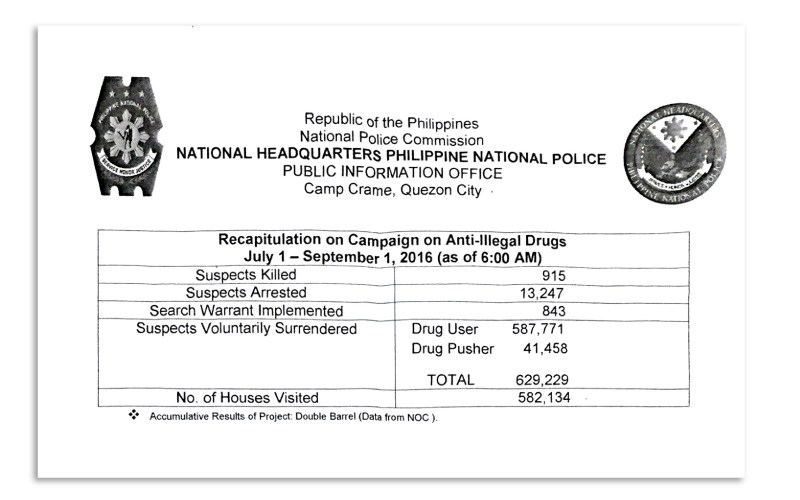
In examining a century of drug policies around the world, Georgetown University adjunct associate professor William B. McAllister warned governments against adopting a "zero tolerance" goal in their drug control strategies not because it is not laudable.
"But because it unrealistic by all historical standards of human behavior," McAllister writes in London School of Economics' series of reports on drug policies endorsed by five Nobel-prize winning economists.
McAllister said a way to define realistic success in drug policy is to set targets for use and abuse.
Such numerical targets are unheard of in Duterte's rhetoric.
"Imagine for example, that a particular country suffered a 10-percent heroin addiction rate among its population. A goal could be set to reduce to, say, 5 percent," he wrote.
"Programs could be implemented to achieve the target rate, and then to maintain the 'floor' percentage so that it did not rise."
But such numerical targets are unheard of in Duterte's rhetoric. (He did say once though that he would kill 100,000 criminals in his first six months in office). Several times, he pledged not to end the war or lift the state of emergency before the last criminal personality has fallen, while viewing human rights concerns a nuisance. Rather than being dismissed as illusory and crude, his statements are often seen as brave, practical goal-setting.
Curato said Duterte's campaign might be succeeding after all if the direction issued is to attack the trade from below through violence.
"If you base it on that level and [the policy is] very clear [in] saying that violence is very much part of it then yes, we are succeeding. But the broader question is, is that the policy that we really want to take?" she said.
Felbab-Brown, meanwhile, finds Duterte's directive as self-defeating, and can even induce survival of the fittest among drug offenders.
"Dealers who remain on the streets will only be those who can either violently oppose law enforcement and vigilante groups or bribe their way to the highest power," she said.
"By eliminating low-level, mostly non-violent dealers, Duterte is paradoxically and counterproductively setting up a situation where more organized and powerful drug traffickers and distribution will emerge."
The very premise of a "war on drugs," for Collins, ignores the fact that drugs could not be completely rooted out, although their effects on society could be minimized.
"[A drug war] is the equivalent of using a sledgehammer to conduct surgery," he said.
If you base it on that level and the [policy is] very clear [in] saying that violence is very much part of it, then yes, we are succeeding. But the broader question is, is that the policy that we really want to take?
- Nicole Curato Sociologist, Institute for Governance and Policy Analysis
Even the mass surrender of 700,000 so far does not indicate victory.
Police chief Dela Rosa aims to have 1.8 million drug users surrender to authorities. Following official estimates, this means enforcers want 100 percent of all drug users listed down and monitored, if they are not killed first.
"This is like saying a violent war on poverty has been 'successful' because thousands of poor people had 'surrendered'. Now what? There is no treatment infrastructure in place," he said.
He suggests that resources be channeled to more productive programs such as health interventions since drugs are primarily a "public health problem."
Felbab-Brown also said no war, even if sustained for a number of years, has successfully lowered the supply of drugs. Instead, she suggests a number of more effective policies for the Philippines without resorting to a witch hunt and letting the bodies pile up.
Drug policy alternatives for the Philippines
Vanda Felbab Brown, expert at Booking Institution
"The right objective should be to minimize violence in criminal markets and maximize public health. For both of those objectives, the war on drugs in the Philippines unleashed by Duterte is not only ineffective but outright counterproductive," Felbab-Brown said.
University of Maryland professor Peter Reuter, a top analyst on illegal markets, told the BBC last year that illegal drugs are a problem that can't be solved, but should instead be managed.
"Choose your problem. There is no solution. Use of psychoactive drugs is a social problem like a whole lot of other social problems. We manage it. And we may manage it better or worse, but the notion that we solve a problem is simplistic," he said.
Policy paradox: It only gets worse
If there is a consensus among drug policy experts, it is that the existence of a drug market only points to larger, more serious concerns that gave rise to narcotics trade and abuse in the first place. Among these are poverty, poor public health systems and weak rule of law.
The paradox is that the means used to confront the drug menace in the past decades, most recently in the Philippines, usually involve human rights violations that, experts say, further corrode rule of law and vilification of drug users who are mostly poor, underemployed or sick. Its long-term effects, looking at experience of other countries, involve worsening of the very troubles drugs are feared to create.
A national household survey by the Dangerous Drugs Board in 2008 found that more than a third of drug users in the country were unemployed. While that might not seem striking, the unemployment rate then was at 7.3 percent, indicating that drug users are a lot more likely to be jobless.
The mass killings in the Philippines will not dry up demand for drugs.
Duterte himself responded to critics who complained that only the small fry have been subjected to police efforts. The rich, he said, use less potent heroin and cocaine, while the poor take meth or "shabu" that could potentially reduce them to a bestial state.
"There are many poor people (arrested and killed) because they are an easy target," Duterte said.
Collins said Duterte's current strategy "will not work on its own merits, since it is entirely unscientific or public health based."
He said already overflowing prisons will be more packed while camps without treatment facilities will be put up to intern those who surrendered. These can lead to more problems.
"The health and welfare conditions in these facilities will go from bad to worse. Disease will spread. Drug markets will likely become established within them. And individuals will lose existing ties with their communities. These are the opposite of the conditions needed to help people with drug dependence issues," Collins said.
With misguided policies, the drug trade, while believed to inspire corruption, can lead to acts of graft by public officers, such as facilitating the flow of drugs in prisons and camps.
"The mass killings in the Philippines will not dry up demand for drugs: the many people who will end up in overcrowded jails (as is already happening) will have a high chance of becoming addicted in prison," Felbab-Brown said.
"There is always smuggling into prisons and many prisons are major drug distribution and consumption spots," Felbab-Brown said.
De facto shoot-to-kill policies, moreover, will give offenders a chance to "institutionalize top-level corruption as only powerful drug traffickers will be able to bribe their way into the system."
"Corrupt top-level cops will engage in witch hunts against their drug business rivals as well as political enemies," she warned.
Conceding that the world's war on drugs has been lost, former Colombian President Cesar Gaviria told BBC's "The Inquiry" that a place with a complete absence of drugs is "something unreachable," a "utopia."
For Duterte's government, however, the fight will go on and it can be won. But how many more people have to die or be killed to achieve the impossible?– Reports from Philstar NewsLab; Graphic design by Jonathan Asuncion and RP Ocampo; Development by Ricky Ulnagan; Videos by Efigenio Toledo IV
